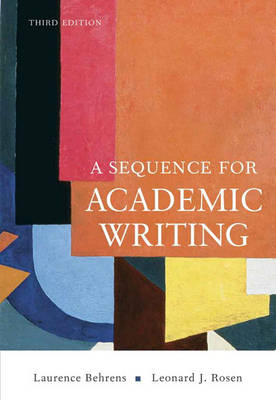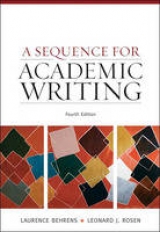
A Sequence for Academic Writing
Pearson (Verlag)
978-0-321-45681-6 (ISBN)
- Titel erscheint in neuer Auflage
- Artikel merken
1. Summary, Paraphrase, and Quotation
What Is a Summary?
Can a Summary Be Objective?
Using the Summary
The Reading Process
How to Write Summaries
Demonstration: Summary
The Future of Love: Kiss Romance Goodbye, It’s Time for the Real Thing, Barbara Graham
Read, Reread, Underline
Divide into Stages of Thought
Write a One- or Two-Sentence Summary of Each Stage of Thought
Write a Thesis: A One- or Two-Sentence Summary of the Entire Passage
Write the First Draft of the Summary
Summarizing a Narrative or Personal Essay
Dreams of Patagonia, Bruce Chatwin
Summarizing Figures and Tables
Paraphrase
Quotations
Choosing Quotations
Incorporating Quotations into Your Sentences
Avoiding Plagiarism
Writing Assignment: Summary
The Political Genius of Abraham Lincoln, Doris Kearns Goodwin
2. Critical Reading and Critique
Critical Reading
Question 1: To What Extent does the Author Succeed in His or Her Purpose?
Writing to Inform
Writing to Persuade
We Are Not Created Equal in Every Way, Joan Ryan
Persuasive Strategies
Writing to Entertain
Question 2: To What Extent Do You Agree or Disagree With the Author?
Critique
How to Write Critiques
Demonstration: Critique
What Is the Author’s Purpose in Writing?
Does He or She Succeed in This Purpose?
To What Extent Do You Agree or Disagree with the Author? Evaluate Assumptions
Model Critique: A Critique of Joan Ryan’s “We Are Not Created Equal in Every Way,” Eric Ralston
Discussion
Writing Assignment: Critique
With No Boys to Ogle, We Had Time to Learn, Christine Flowers
3. Explanatory Synthesis
What is a Synthesis?
Purpose
Using Your Sources
Types of Syntheses: Explanatory and Argument
How to Write Syntheses
The Explanatory Synthesis
Demonstration: Explanatory Synthesis–The Car of the Future?
The Vanishing Mirage of Saudi Oil: Dwindling Reserves May End the Petroleum Age, Michael T. Klare
The Fuel Subsidy We Need, Ricardo Bayon
Putting the Hindenburg to Rest, Jim Motavalli
Sustainable Energy: Fuel Cells, New Zealand Ministry of Economic Development
Using Fossil Fuels in Energy Process Gets Us Nowhere, Jeremy Rifkin
Renewable Energy and Fuel Cells, Donald F. Anthrop
Do Hybrids Really Pay Off?, Jim Mackinnon and Dave Scott
Lots of Hot Air about Hydrogen, Joseph J. Romm
Consider Your Purpose
Formulate a Thesis
Decide How You Will Use Your Source Material
Develop an Organizational Plan
Summary Statements
Write the Topic Sentences
Write Your Synthesis
Model Paper: The Hydrogen Fuel Cell Car, Janice Hunte
Discussion and Suggestions for Revision
Revise Your Synthesis: Global, Local, and Surface Revisions
Revised Model Paper: The Car of the Future?, Janice Hunte
4. Argument Synthesis
What Is an Argument Synthesis?
The Elements of Argument: Claim, Support, and Assumption
The Three Appeals of Argument: Logos, Ethos, Pathos
Demonstration: Developing an Argument Synthesis–Volunteering in America
A New Start for National Service, John McCain and Evan Bayh
A Time to Heed the Call, David Gergen
Volunteering in the United States, Bureau of Labor Statistics
AmeriCorp Mission Statement
National Service, Political Socialization, and Citizenship, Eric B. Gorham
Calls for National Service, Roger Landrum, Donald J. Eberly, and Michael W. Sherraden
The Moral Equivalent of War, William James
Crito, Plato
Keeping Alive the Spirit of National Service, Richard North Patterson
Rumsfeld: No Need for Draft; `Disadvantages Notable,’ Kathleen T. Rehm
Politics and National Service: A Virus Attacks the Volunteer Sector, Bruce Chapman
Consider Your Purpose
Making a Claim: Formulate a Thesis
Decide How You Will Use Your Source Material
Develop an Organizational Plan
Argument Strategy
Draft and Revise Your Synthesis
Model Synthesis: Keeping Volunteering Voluntary
Discussion
Developing and Organizing the Support for Your Arguments
Summarize, Paraphrase, and Quote Supporting Evidence
Provide Various Types of Evidence and Motivational Appeals
Use Climactic Order
Use Logical or Conventional Order
Present and Respond to Counterarguments
Use Concession
Avoid Common Fallacies in Developing and Using Support
The Comparison-and-Contrast Synthesis
Organizing Comparison-and-Contrast Syntheses
A Case for Comparison-Contrast: World War I and World War II
Model Exam Response: Key Similarities and Differences between World Wars I and II
Discussion
Summary of Synthesis Chapters
5. Analysis
What Is an Analysis?
Demonstration of Analyses
The Plug-In Drug, Marie Winn
Model Paper: The Coming Apart of a Dorm Society, Edward Peselman
How to Write Analyses
Consider Your Purpose
Locate an Analytical Principle
Formulate a Thesis
Develop an Organizational Plan
Draft and Revise Your Analysis
Attribute Sources Appropriately
Writing Assignment: Analysis
A Theory of Human Motivation, Abraham H. Maslow
Analyzing Visual Media
Writing Assignment: Analyzing Visual Media
Advertisement: Fancy Feast Cat Food
Advertisement: [title to come]
Advertisement: GE Monogram Appliances
The Appeal of the Democracy of Goods, Roland Marchand
Elements of an Effective Layout, Dorothy Cohen
Analysis: A Tool for Understanding
6. Writing as a Process
Writing as Thinking
Stages of the Writing Process
Stage 1: Understanding the Task
Papers in the Academic Disciplines
Stage 2: Gathering Data
Types of Data
Stage 3: Invention
Choosing and Narrowing Your Subject
Invention Strategies
Stage 4: Drafting
Strategies for Writing the Paper
Writing a Thesis
Writing Introductions and Conclusions
Stage 5: Revision
Characteristics of Good Papers
The Reverse Outline
Stage 6: Editing
Editing for Style
Editing for Correctness
The Final Draft
Writing Assignment: Process
7. Locating, Mining, and Citing Sources
Source-Based Papers
The Research Question
Locating Sources
Preliminary Research
Consulting Knowledgeable People
Encyclopedias
Overviews and Bibliographies in Recent Books
Focused Research
Electronic Databases
The Benefits and Pitfalls of the World Wide Web
Evaluating Web Sources
Periodicals: General
Periodicals: Specialized
Books
Biographical Indexes
Dictionaries
Other Sources/Government Publications
Interviews and Surveys
Mining Sources
The Working Bibliography
Note-Taking
Evaluating Sources
Arranging Your Notes: The Outline
Citing Sources
In-Text Citation
Full Citations
MLA Style
In-Text Citation
Examples of MLA Citations in Works Cited List
APA Style
In-Text Citation
Examples of APA Citations in References List
Writing Assignment: Source-Based Paper
8. A Case Study in Academic Writing
The Assignment: A Comparative Analysis
The Sources
From All Quiet on the Western Front, Erich Maria Remarque
Death in Victory, John Singer Sargent
John Singer Sargent’s Murals, Mary Crawford Volk
Cemetary Symbolism, Pam Reid
Cemetary Symbols: The Palm, Richard Reisem
The Outline
The Paper: “Death in War: A Comparative Analysis of John Singer Sargent’s Death and Victory and Erich Maria Remarque’s All Quiet on the Western Front.”
Discussion
9. Practicing Academic Writing
The Assignments.
Summary.
Paraphrase.
Critique.
Explanatory Synthesis.
Argument Synthesis.
Analysis.
The Readings
The Curse of Nepotism, The Economist
May the Best Man or Woman Win, Miriam Shulman
Legacy Admissions are Defensible, Debra Thomas and Terry Shepard
Time to Bury the Legacy, Robert DeKoven
The History of Legacy Policies, Cameron Howell and Sarah E. Turner
Getting In: The Social Logic of Ivy League Admissions, Malcolm Gladwell
So Your Dad Went to Harvard, Mark Megalli
End Special Privilege, John Edwards
Preserve Universities’ Right to Shape Special Community, USA Today
Admissions Confidential: An Insider’s Account of the Elite College Selection Process, Rachel Toor
Making Ethical Decisions, Gerald Cavanagh
| Erscheint lt. Verlag | 21.11.2006 |
|---|---|
| Sprache | englisch |
| Maße | 162 x 235 mm |
| Gewicht | 501 g |
| Themenwelt | Schulbuch / Wörterbuch ► Wörterbuch / Fremdsprachen |
| Geisteswissenschaften ► Sprach- / Literaturwissenschaft ► Sprachwissenschaft | |
| ISBN-10 | 0-321-45681-5 / 0321456815 |
| ISBN-13 | 978-0-321-45681-6 / 9780321456816 |
| Zustand | Neuware |
| Haben Sie eine Frage zum Produkt? |
aus dem Bereich



